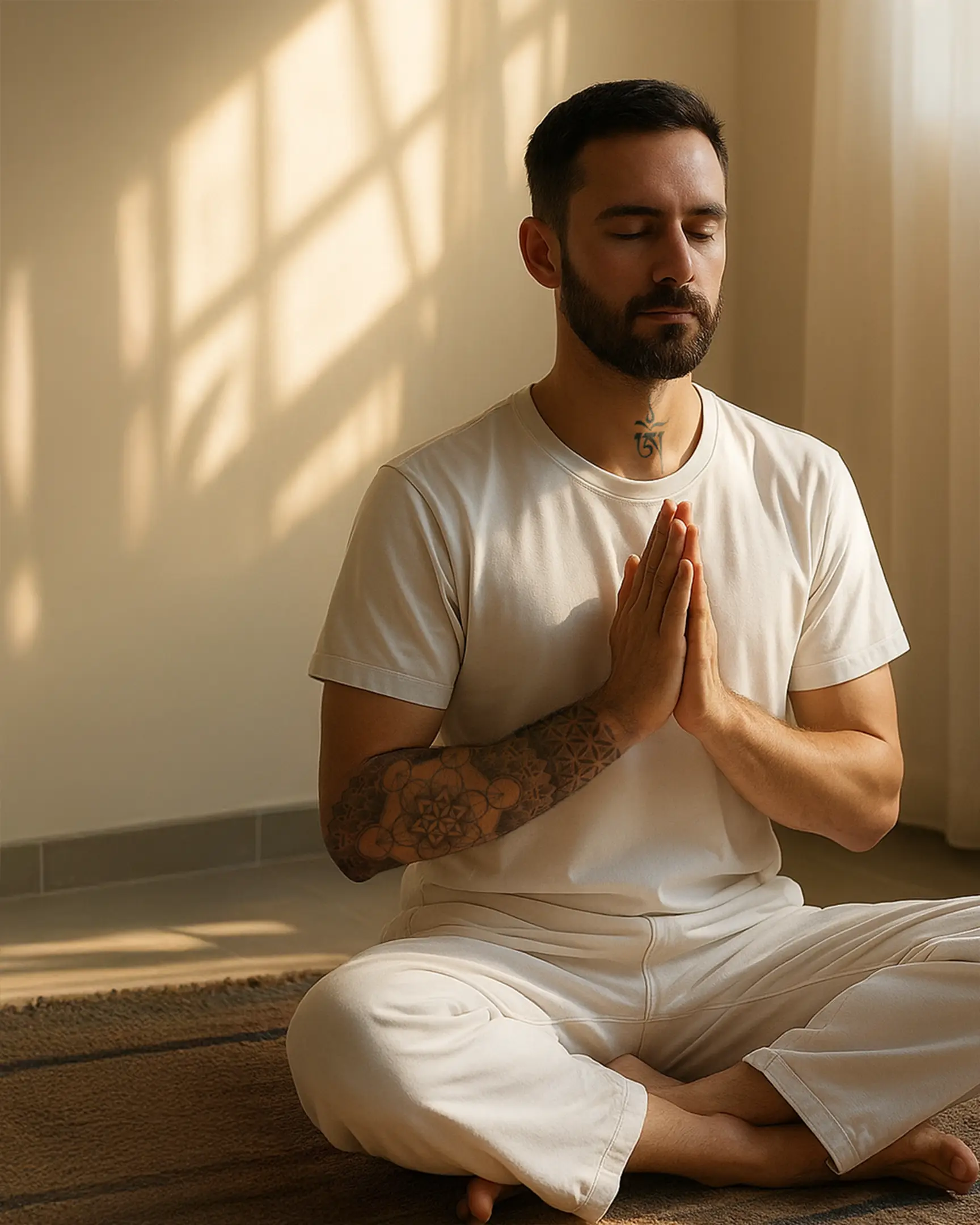Can a Tattoo be a Spiritual Experience?
- Team Aliens
- May 15, 2025
- 9 min read
Updated: Jul 23, 2025

There are moments on the spiritual path that change everything—not outwardly, but internally. A long-held belief unravels. A truth lands in your chest. A wound, once buried, breathes for the first time. These moments may not be loud, but they echo through your life. You don’t always share them, but you feel them. You know you’ve crossed a threshold. You’re no longer who you were.
This shift is hard to explain. It’s an ache. A relief. A release. It’s the kind of transformation that doesn’t ask for celebration—it asks for recognition. To be held, remembered, honored. And in that stillness, the desire to externalize this inner evolution begins to grow. For some, it becomes more than personal change—it is a divine awakening. A feeling that connects them to a higher power, the Universe, or even a moment where they feel seen by God or something greater than themselves.
The Call for Symbols in Our Spiritual Growth

As we walk the path of spiritual growth, we often find that words are not enough to express the depths of our inner transformations. There’s a quiet yearning to capture the essence of what has shifted within us, a desire to mark the milestones of our soul’s journey. This is where symbols come in.
Since the dawn of human existence, we have turned to symbols as a way to express the ineffable. These symbols are not just representations; they are powerful conduits for the energies and experiences we cannot easily articulate. From ancient civilizations to modern spiritual practices, symbols have been carved in stone, woven into cloth, or inked on skin to hold what words cannot. They represent our deepest truths, our beliefs, and our connection to something greater than ourselves.
Carl Jung once wrote, “Symbols are the language of the soul.” In every culture, across every era, symbols have served as vehicles for spiritual truths. Whether it’s the spiral of life, the circle of wholeness, or the lotus of awakening, these symbols are not just pictures they are deeply ingrained in our collective consciousness. They carry the energy of our most profound experiences, and through them, we are able to connect with something eternal.
As we traverse the spiritual path, where much of the growth is invisible, symbols become anchors—allowing us to externalize the intangible and hold it in our hands, our hearts, and on our skin. They are the emotional touchstones that remind us of the unseen work we’ve done, and serve as reminders of who we are becoming.
Tattoos as Spiritual Anchors

Tattoos are far more than just marks on the skin—they are symbols that reflect spiritual milestones and personal transformations. They are the powerful representations of our inner evolution, marking the moments in our lives when we’ve broken free from old patterns, embraced new wisdom, or undergone profound change.
Unlike the temporary nature of many external symbols, tattoos serve as permanent reminders of our spiritual journeys. They become anchors, helping us to hold onto the essence of who we are and who we’ve become. Each tattoo tells a story—not just of personal history but of spiritual growth, the ongoing process of becoming our most authentic selves.
In this sense, tattoos are not merely decorative; they carry profound meaning, often representing core beliefs, experiences, or shifts in consciousness. Whether it's a symbol of healing, protection, or personal power, each design is a reflection of the journey the wearer has walked and the lessons they've embraced.
The Process of Tattooing as a Spiritual Experience

For many, the tattooing process itself is a deeply spiritual experience—one that goes beyond the physical act of getting inked. It’s a ritual in which the body becomes the canvas for inner transformation. The discomfort, the focus, the presence—these elements all contribute to the spiritual significance of the moment.
Tattooing calls for stillness and surrender, much like a spiritual practice or meditation. The needle puncturing the skin is not just a physical sensation; it becomes a catalyst for personal growth and emotional release. In the stillness of the tattoo process, the wearer often connects deeply with their inner self, embracing the discomfort and uncertainty as part of the transformative journey.
The experience of being marked in the literal and figurative sense—becomes a spiritual passage, a moment where the individual steps into their higher self. Some report feeling an awakening, as if the tattooing process serves as a divine connection, guiding them toward a higher state of awareness. This connection might feel like a touch of the divine or the sensation of receiving spiritual wisdom through the ink.
For these individuals, the tattoo becomes more than art; it’s a channel for spiritual energy. It’s a sacred act, an external representation of the work they’ve done internally, a permanent symbol of spiritual enlightenment, healing, and connection.
Tattoos in Indigenous Cultures
In various indigenous cultures, tattoos were regarded as sacred practices, essential to spiritual beliefs and identity. They were not just decorations but ritualistic symbols that reflected a person’s connection to their ancestors, nature, or spiritual world. Tattoos were often viewed as a form of spiritual protection, providing strength and guidance on the journey through life.
For instance, in Polynesian culture, tattoos were deeply spiritual. The intricate designs weren’t merely artistic—they were considered spiritual shields that offered the wearer protection. The tattoos connected them to the energy of their ancestors, invoking strength, wisdom, and the divine. Each tattoo pattern had its own unique significance, marking milestones in a person's life, their social rank, or the spiritual power they held. In these cultures, tattoos were not just worn—they were revered as living symbols that embodied the power of the wearer's lineage.
Similarly, Maori tattoos (moko) were considered sacred markings that connected the individual to their ancestral roots. These tattoos, carved on the face or body, were not only an expression of personal identity but were also believed to embody the wearer’s spiritual power. The intricate patterns and placement of the moko were thought to provide protection, serve as a declaration of honor, and link the individual to a greater spiritual force.
In Native American cultures, tattoos were used to symbolize spiritual milestones and tribal identity. Some tribes used tattoos as rites of passage, marking key events in a person’s life, such as their coming of age, warrior status, or spiritual awakening. Tattoos in these cultures often represented a deep connection to the natural world, the elements, and spirit animals.
Tattoos in Ancient Egypt and Rome
In ancient Egypt, tattoos were often used for spiritual and medicinal purposes. Women in particular wore tattoos as protective symbols, especially during childbirth, believing that the tattoos would shield them from harm. These sacred markings were not just decorative but were believed to channel divine energy, offering spiritual protection and healing.
In ancient Rome, tattoos had a different but equally spiritual significance. While the Roman military used tattoos as a mark of identity—often for soldiers and slaves—they were also considered to carry spiritual and protective qualities. Soldiers believed that the symbols tattooed on their bodies would give them the strength and courage needed in battle. The tattoos were seen as spiritual shields, providing the wearer with not just physical protection, but also inner fortitude. This belief in the power of symbols to channel spiritual energy carried on throughout Roman history, creating a deeper connection between the tattooed body and its mystical powers.
Tattoos as a Personal Spiritual Journey
While tattoos have deep historical and cultural roots, their significance continues to evolve in modern spiritual practices. Today, many individuals approach tattoos as personal symbols of transformation and healing. The act of getting a tattoo can represent a spiritual journey, a way to externalize internal shifts that may otherwise be difficult to express.
In contemporary spiritual practices such as Reiki, chakra healing, and spiritual wellness, tattoos are viewed as tools for personal growth and alignment. Many people choose tattoos to mark milestones in their spiritual development—whether it’s a representation of overcoming trauma, embracing self-love, or connecting to their higher self. Tattoos become a powerful form of self-expression, a reminder of one’s inner journey, and a way to carry spiritual energy with them in a permanent form.
For instance, a chakra tattoo might be chosen to align and balance the body’s energy, while other symbols—such as mandalas or lotus flowers—are often used as reminders of spiritual growth, awakening, and inner peace. Some choose tattoos to honor their relationship with the divine, representing their spiritual beliefs, their connection to God, or their experience of awakening.
Tattoos in this context serve as living symbols, constantly reflecting the wearer’s ongoing spiritual journey. As individuals evolve, so too does the meaning of their tattoos, making them not just external adornments, but spiritual markers that accompany the person throughout their life.
The Energy of Tattoos and Transformation
Tattoos are not just physical adornments; they are spiritual channels—places where energy flows and is transformed. Each design carries a unique energetic imprint, one that holds emotional, psychological, and spiritual meaning. Tattoos act as conduits, allowing us to express the intangible, to channel our internal energy into something permanent on our kin.
The act of tattooing isn’t simply a process of marking the body; it’s a spiritual exchange. As the needle touches the skin, the energy that once resided inside us—whether it be pain, joy, love, or loss—begins to flow outward. The ink becomes a medium, transforming the unseen into something tangible, capturing the spiritual journey of the individual on the skin. Each line, curve, and shape in the tattoo design is not just ink; it holds the essence of the story—the truths that we wish to embody and share with the world.
This process is profoundly transformative. Many wearers describe how their tattoos hold the power of personal growth and change, marking milestones of their spiritual journey. It’s as though the design itself carries the energy of transformation, offering the wearer a permanent reflection of the growth they’ve experienced.
Personal Healing and Empowerment
Tattoos are often not just a form of self-expression, but also tools for healing. For many individuals, the process of getting a tattoo symbolizes a transformative experience, one that allows them to move past trauma or grief. A tattoo can become a visual representation of personal empowerment, symbolizing strength, resilience, and the healing journey.
For example, a person who has faced loss or hardship might choose a tattoo that represents hope, renewal, or rebirth. The tattoo becomes a reminder that they have overcome, that they are no longer defined by the trauma they have endured. Each tattoo serves as a milestone—marking the wearer’s progress on the path to self-empowerment, and offering a daily visual reminder that they are in control of their transformation. It’s not just about covering up old wounds; it’s about turning them into a symbol of strength.
Tattoos, therefore, can be protective symbols—imprints of healing and self-love that shield the wearer from negative energy or self-doubt. They help reinforce a sense of self-worth and personal power, empowering the wearer to move forward in their journey with confidence and clarity.
The Tattoo as a Form of Divine Expression

Tattoos are not merely aesthetic choices; for some, they become deeply divine expressions—acts of devotion, spiritual practices, and offerings to the higher powers they believe in. The process of getting a tattoo, for these individuals, becomes a spiritual ritual—a sacred act that marks their connection to something greater than themselves. It is often more than a personal statement; it becomes a divine declaration.
For some, getting tattooed is an act of devotion—a way to offer gratitude, honor, or prayer to their higher self or the divine. The tattoo is more than just an image; it’s an offering, a sacred bond created through the act of marking the body. As they sit through the tattooing process, these individuals feel the presence of the divine, experiencing a sense of connection or even enlightenment as they undergo this transformative ritual.
Experiencing God Through Tattoos
Some wearers feel that their tattoos symbolize more than their personal identity or emotional growth they represent a divine relationship. Getting a tattoo can feel like a spiritual awakening or even an experience of God. The process, for them, is akin to receiving a blessing or marking a sacred moment in their lives. They feel as though their tattoo is not just a reflection of who they are, but a symbol of their connection to the divine or a spiritual transformation.
For these individuals, tattoos are not just body art; they are sacred symbols that reflect a profound spiritual experience. Whether it’s a spiritual image that resonates deeply or a design that embodies their faith, the tattoo becomes a divine marking of their inner transformation. The tattoo becomes a living testament to their relationship with the divine, a constant reminder of their higher purpose, and their spiritual evolution.
Embrace Your Spiritual Journey Through Tattoos
Tattoos represent a deeper connection to the self and the divine. They serve as living symbols of transformation, healing, and personal milestones—each one telling a unique story of spiritual growth. By embracing the process of tattooing, you invite a spiritual experience that marks not only the body but the journey of your soul. Let your tattoo be a lasting reminder of the strength, wisdom, and higher purpose you carry within.












